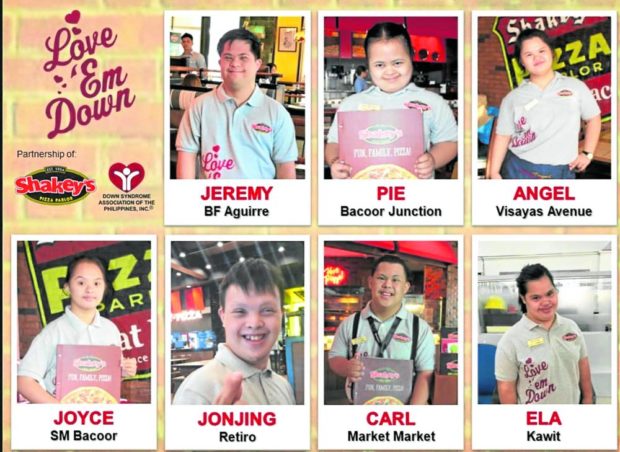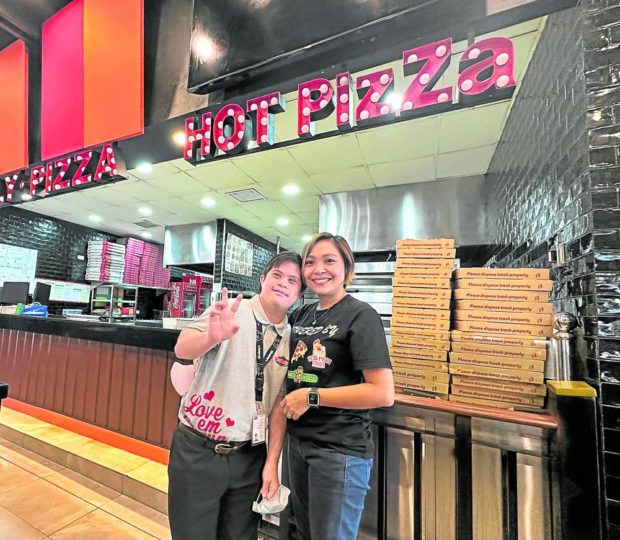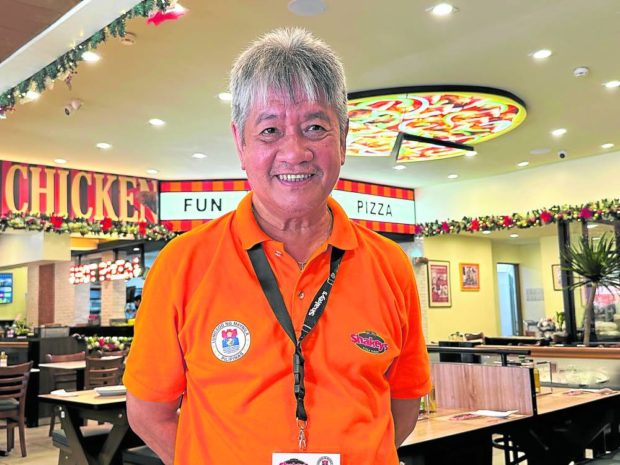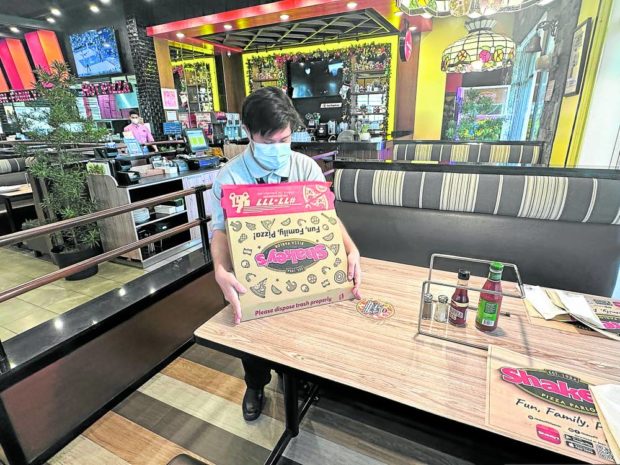Shakey’s welcomes special needs kids, seniors to its crew

SPECIAL 7 The seven kids who have joined the crew of Shakey’s with the revival of Love ‘Em Down program last September —Contributed photo
Jeremy Lapeña is like a celebrity at Shakey’s Pizza BF Aguirre branch. He greets diners with a big smile, brings out the menu, sweeps the floors, sets the table, folds napkins and pizza boxes and sings “happy birthday” to guests, among other chores. Sometimes, he gets to serve pizza, and is excited to pump party balloons and hand out stuffed toys to little kids.
He is not your ordinary restaurant server. Born with Down syndrome, the 26-year-old enjoys crewing at the pizza parlor, which is just a 10-minute walk from his house. Despite his limited vocabulary, he bonds well with coworkers and guests. He is especially affectionate to young people.
Diners are pleasantly surprised to see Jeremy as part of the crew. Parents of kids who have the same condition go to this Shakey’s branch just to see Jeremy, inspired by how he has thrived despite being differently abled.
When he feels that guests want to take a picture with him, Jeremy voluntarily goes to their table, says his trainer and store buddy, Marichel Malabanan. “Mas sikat pa yan sa aming lahat dito (He is more famous than any of us here),” she says.
Jeremy has been helping out at Shakey’s BF store since 2018, interrupted only by the COVID-19 lockdowns. With the lifting of mobility restrictions, he reported back to work in September this year. He takes a five-hour shift three times a week, on Mondays, Wednesdays and Fridays. When he started at this program before the pandemic, he was just doing two-hour shifts.
This is his first job with regular allowance, says his mother Agnes. However, he had taken volunteer jobs a few times before, like in a special school where he had his therapy, in a laundromat and in another restaurant. “He likes being independent,” says Agnes. Jeremy is the youngest among her three children.
Aside from crewing at Shakey’s, Jeremy also plays golf like his father, a businessman, and serves as an altar boy at their church. At home, he likes tending the garden.
What does he use his money for? Jeremy tells Inquirer, “iPad,” adding “orange car.”
His mother explains that using three months’ worth of savings, including a windfall from a recent modeling gig for SM, Jeremy recently bought a secondhand iPad as his old one had bogged down. On the other hand, “orange car” is what he always says he wants to buy.
His smartphone, a hand-me-down from his mother, has a Lazada app. There is now more than P1 million worth of merchandise in his shopping cart, says his mom. No, the app isn’t linked to any payment mode; the goodies are never checked out.
Then he says, “High school, classmates, party, Shakey’s,” which means he would like to go to his high school, see his classmates and have a party at Shakey’s, his mom interprets. He is drawn to typical kids, whom he considers his “classmates.”
Aside from their pizza and mojos, Jeremy’s favorite is R&B milk tea, which he sometimes consumes secretly. As the caffeine makes him hyperactive in the evenings, his mom discourages excessive consumption of it.
There was a time when the zealous Jeremy took a customer’s order, even when he wasn’t supposed to. The order was never relayed to the kitchen, so it didn’t arrive, but the customers didn’t get upset.
“His receptive skills are good, [but he is] not expressive,” says Agnes.
Love ‘Em DownJeremy is part of the pioneer batch of “Love ‘Em Down” program that was launched by Shakey’s in 2018 in partnership with Down Syndrome Association of the Philippines, Inc. (DSAPI). The program brings to fore the capacity and skills of people with Down syndrome through productive and engaging interactions with Shakey’s guests and employees.
“Shakey’s donates a certain amount to the association and the association gives it to the children as an allowance,” says Agnes.
Before the pandemic, Shakey’s and DSAPI had enlisted as many as 30 Down youngsters and deployed them to various corporate-owned branches. This was halted during the pandemic lockdowns. But with the easing of mobility restrictions, Shakey’s has relaunched the program with the first seven participants, including Jeremy.
The program aims to provide persons with Down Syndrome an additional environment for fun and learning. It also seeks to foster employee and guest engagement, by giving them an opportunity to participate in community-building activities where they can help create joyful moments for differently-abled individuals.
“Persons with Down syndrome have different abilities. Not all are able to attend regular schools, although we have some who are even able to attend college but the majority really require special education and they plateau in academics, but they can continue developing other skills,” says Agnes, who is a full-time housewife but active with the advocacy work of DSAPI.
“That’s why this program is very good. We’ve had some [other] establishments offering jobs for PWDs (persons with disabilities) but they have certain requirements, [like] taking on 8 a.m. to 5 p.m. jobs. Some kids can do that but it’s more the exception,” she said.
DSAPI invites kids with Down Syndrome who can perform the basic tasks, like greeting the guests, opening the door, setting the table and giving the menu. They are also allowed to serve the food, with assistance from the staff.
“What’s nice about this program is you don’t need it to be really high-functioning kids, because most of these kids are really not able to function like a typical person,” Agnes says.
“Initially we thought that this would be good for the kids. But it really is good for the kids. It builds their confidence. They’re able to even improve their vocabulary because you learn words like serve, menu or mojos, like that. And they’re able to do it at home. From their work, that confidence and the discipline, they’re able to bring it at home. Even during the pandemic, this boy would fold napkins at home,” she narrates.
Another early program participant, Vicky Lou from the Magallanes branch, continued to set the table and bring out the plates during the lockdowns, she notes.
To help prepare its new set of hires, Shakey’s created development programs to orient and equip them with the skills to perform their tasks at the store. All store employees are likewise being trained to provide support and create a safe and secure environment for their new team members.
“On the first and second day, that’s the training period. So we ask the buddy to help or to teach them, and then the buddy is on standby to see if he’s doing it properly. But even after the two days, there’s always a buddy that is assigned to the participant, as interactive guide and then, at the same time, they also try to give them additional tasks,” says Lissa Macapagal.
“Having them in our stores was a gift. They were having fun, learning, and interacting with our guests. They brought a deeper sense of joy and family to Shakey’s. We are truly grateful to them and their families for giving us the privilege of working alongside each other,” says Shakey’s Pizza Asia Ventures Inc. president Vicente Gregorio.
The silver employee
Reynaldo Alison of Pandacan, Manila is not one who will just sit idly by after retirement.
A college graduate who had held a white-collar job for most of his professional life, the 66-year-old isn’t fussy with job descriptions and just wants to remain productive.
“I don’t want to get bored doing nothing,” he says in an interview with Inquirer.
“I want to keep myself busy. I don’t want to waste my time. Time is gold,” he adds.
Yet he knows it is difficult for rank-and-file seniors like him to find an office job. When he first went to Manila City hall to look for a job, he was willing to take on even a janitorial post. He has also volunteered as a barangay tanod in his community, and was even elected to lead the team.
Reynaldo is now a part-timer at Shakey’s Malate branch, a busy store which operates 24/7. He works as a server from 10 am to 2 pm, in time for the usual peak in customer demand at lunch time.
“I don’t wait for supervisors to tell me what to do, alam ko na gagawin. Ako na talaga humahanap ng magagawa (I know what to do and I look for what is needed to be done),” he says.
Because of his age, he is not allowed to mop the floor, even if he insists he could still do it.
Compared with other people his age, he looks fit, and can bike to work when it is not too hot. He still has a fairly good eyesight and doesn’t need eyeglasses to function.
A commerce degree-holder from University of the East, he had worked for 20 years as a clerk at Mercury Drug, where he was in charge of payrolls, before retirement.
Reynaldo and his wife have three children, all of whom are now adults. Two have families of their own. He has five grandchildren.
All of his children and their families still live in the same roof. It is the same house where his wife has lived since birth. It was inherited from her parents; however, they don’t own the lot and still have to pay the rent.
When Reynaldo retired from his clerical job, part of the lump sum he got was used to pay for rental arrears.
Reynaldo says he likes to be independent and don’t want to depend on anyone. He takes care of the electricity and water utility bills. His wife still works as an all-around staffer.
While they live in the same house, his children fend for their own. The eldest finished college and now works for a health maintenance organization. The other two married early and didn’t finish college.
In 2020, Reynaldo heard from his neighbors that there is an office at city hall that implements a special job placement program for seniors.
Partnership with Manila
In 1999, Congress passed the Public Employment Service Office (Peso) Act to support the Department of Labor and Employment. Peso is a multi-dimensional employment service facility or entity established in all local government units. Peso caters to regular jobseekers and employers, as well as students, out of school youth, migrant workers, persons with disabilities (PWDs), returning overseas Filipino workers, displaced workers, researchers/planners and senior citizens.
In partnership with Peso, Shakey’s launched last September its senior citizen and PWD hiring program for all stores in the City of Manila. Originally initiated prior to the onset of the COVID-19 pandemic, the program aims to provide senior citizens and PWDs an avenue to earn income for their families; however, amid the pandemic, it was put on hold in light of quarantine restrictions on health and safety.
But now that mobility restrictions have eased and many in the populace have been vaccinated, the initiative has been rekindled. Shakey’s has made it a policy to hire one senior citizen and one PWD for every branch in Manila.
“We are absolutely thrilled to be working with the City of Manila on this initiative. Many of the elderly and PWDs have the capability and desire to take an active part in our society through gainful employment but, sadly, are often overlooked, making them a vulnerable sector. Together with Peso-Manila,” says Shakey’s president Gregorio.
“…We hope we can make a meaningful difference in their lives. Shakey’s doors are wide open to welcome seniors and PWDs as valuable members of our team,” he adds.
Reynaldo says he had applied at Peso as early as 2020, and was originally assigned to McDonald’s. However, the pandemic erupted and restaurants were shut down. In 2021, he applied anew, but then there came another round of lockdowns.
Reynaldo tried for a third time this 2022, and finally got a slot at Shakey’s. At this Malate branch, he also works with a deaf and mute person, as part of the partnership with Peso to create opportunities for seniors and PWDs.
Under the arrangement with Peso, the seniors can work only for three months, which can be extended to six months if recommended by management. This is the maximum length of probationary employment under the Labor Code, after which it automatically becomes regular employment. Seniors like Reynaldo who would like to participate in the program are required to undergo medical examinations, drug test and submit a police clearance.
It’s the medical examination, which he had undergone three times, that tires him the most. It’s all free but it’s a long wait at the government hospitals.
4-hour gig
In August this year, the Philippine Statistics Authority reported an increasing number of labor force entrants from higher age groups, or those above 35 years old.
The labor force participation rate for those age 65 and above—referring to senior citizens either working or actively looking for a job—increased to 38.2 percent from 34.9 percent last May. Majority of them looked for jobs to help their families cope with rising prices.
For his part, Reynaldo earns P285 a day working on a four-hour shift at Shakey’s, equivalent to half the daily minimum wage. His PWD peer is allowed to work for full eight hours a day.
Although it’s not much, it augments Reynaldo’s modest monthly pension and keeps him preoccupied.
He does not scrimp during his lunch break and buys only food from Shakey’s. He has looked around the area and doesn’t like street food, even if he has to pay a bit more.
He spends about P135 to P150 for his lunch.
“Pizza brings happiness to me,” he says, adding he won’t get tired of eating food from this restaurant every day.
“Kaya nga ho nagtratrabaho di ba para kumain ng quality food (That’s why I still work, to be able to afford quality food),” he says.
On Dec. 15, his three-month term at Shakey’s will end. He is hoping for a term extension to six months, and get another assignment, and another. For as long as he can, he will work. INQ


